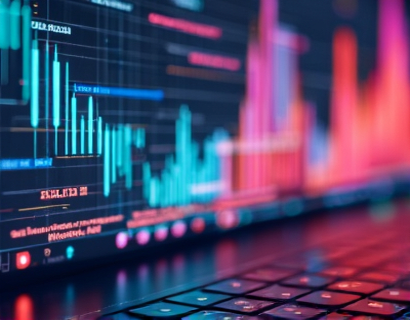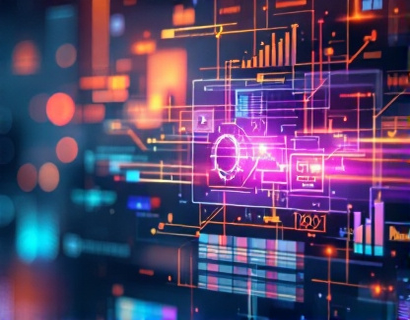Unleashing the Future of Digital Finance: The Intelligent Synergy of AI and Crypto
The intersection of artificial intelligence and cryptocurrency is giving birth to a new era in digital finance, one that promises unparalleled efficiency, security, and user experience. This transformative fusion is not just a technological advancement but a paradigm shift in how we perceive and interact with financial systems. As we delve into this topic, it's essential to understand the foundational elements that make this synergy possible and the profound impact it has on the future of finance.
The Foundations of AI and Crypto
Artificial intelligence, at its core, is about creating systems that can perform tasks requiring human intelligence, such as learning, reasoning, and self-correction. In the context of digital finance, AI technologies like machine learning, natural language processing, and predictive analytics are revolutionizing traditional financial operations. On the other hand, cryptocurrency, particularly blockchain technology, offers a decentralized, transparent, and secure way to conduct transactions without the need for intermediaries.
Blockchain, the underlying technology of cryptocurrencies, is a distributed ledger that records transactions across multiple computers in such a way that the registered transactions cannot be altered retroactively. This inherent transparency and immutability make it an ideal platform for AI applications, which thrive on data integrity and accessibility.
Enhancing Security with AI
One of the most significant benefits of combining AI with cryptocurrency is the enhancement of security measures. Traditional financial systems are often targeted by sophisticated cyber-attacks, leading to substantial financial losses and data breaches. AI can detect and mitigate these threats more effectively by analyzing patterns and anomalies in real-time.
For instance, machine learning algorithms can be trained to identify fraudulent transactions by learning from historical data. These algorithms continuously adapt and improve, making it increasingly difficult for malicious actors to bypass the system. Smart contracts, self-executing contracts with the terms directly written into code, can also be enhanced with AI to ensure that all conditions are met before execution, reducing the risk of errors and fraud.
Optimizing Trading Strategies
The trading landscape is undergoing a radical transformation thanks to AI-driven insights. Cryptocurrency markets are known for their volatility and complexity, making traditional trading strategies often inadequate. AI algorithms can process vast amounts of data from various sources, including market trends, news sentiment, and historical price movements, to generate predictive models.
These models can identify potential trading opportunities and optimize strategies in real-time. For example, reinforcement learning, a type of machine learning, can simulate countless trading scenarios to find the most profitable strategies. This not only increases the efficiency of trading but also reduces the emotional bias that human traders might have, leading to more rational and profitable decisions.
Personalized Financial Services
The integration of AI in digital finance extends to providing personalized financial services to users. By leveraging user data and behavior patterns, AI can offer tailored investment advice, risk assessments, and financial planning tools. This level of personalization is particularly valuable in the crypto space, where the diversity of assets and the complexity of the market can be overwhelming for individual investors.
For instance, AI-powered robo-advisors can analyze a user's financial goals, risk tolerance, and market preferences to create a customized investment portfolio. These advisors can also monitor market conditions and adjust the portfolio in real-time to optimize returns and minimize risks. This not only democratizes access to sophisticated financial tools but also empowers users to make informed decisions.
Improving User Experience
The user experience in digital finance is significantly enhanced through AI-driven interfaces and services. Natural language processing (NLP) enables more intuitive and conversational interactions between users and financial platforms. Chatbots and virtual assistants can handle a wide range of queries, from basic account information to complex investment strategies, providing 24/7 support and reducing the need for human intervention.
Moreover, AI can analyze user behavior and preferences to create a more seamless and user-friendly experience. For example, recommendation systems can suggest relevant financial products or services based on a user's past interactions and preferences. This not only enhances user satisfaction but also increases engagement and loyalty.
Challenges and Considerations
While the synergy between AI and cryptocurrency offers numerous benefits, it also presents several challenges that need to be addressed. One of the primary concerns is the regulatory landscape. The decentralized nature of cryptocurrencies and the complex algorithms used in AI systems can make it difficult for regulators to enforce existing laws and create new ones that ensure fairness, transparency, and consumer protection.
Another challenge is the ethical use of data. AI systems rely heavily on data, and the collection and use of user data must be handled with utmost care to protect privacy and prevent misuse. Transparency in how data is used and giving users control over their data are crucial steps in building trust and ensuring ethical practices.
The Future of Digital Finance
The future of digital finance is intrinsically linked to the continued development and integration of AI and cryptocurrency. As technology advances, we can expect even more innovative applications and services that further blur the lines between traditional finance and the digital realm. The potential for decentralized finance (DeFi) platforms, which aim to recreate traditional financial services on blockchain, is immense. AI can play a pivotal role in making these platforms more efficient, secure, and user-friendly.
Furthermore, the convergence of AI and cryptocurrency is likely to drive the adoption of digital assets in mainstream finance. As institutions and corporations recognize the benefits of blockchain and AI, we may see a shift towards more inclusive and accessible financial systems. This could lead to greater financial inclusion, especially in underserved regions, by providing access to financial services without the need for traditional banking infrastructure.
Conclusion
The fusion of AI and cryptocurrency is not just a technological trend but a fundamental transformation of digital finance. This intelligent synergy is enhancing security, optimizing trading strategies, personalizing financial services, and improving user experiences. While challenges remain, the potential benefits are vast and promising. As we continue to explore and harness this synergy, we move closer to a future where digital finance is more efficient, secure, and accessible than ever before.










































